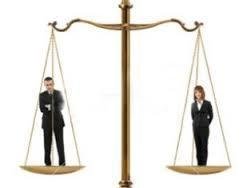By Ojiambo Steven Odemo
From the genesis of creation, the Almighty God created two genders – male and female, that is, Adam and Eve, respectively. The creatures were equal before the creator, though the female was a helper, still God endorsed each with different responsibilities out of His divine wisdom. However, with time as the population increased from a pair to millions of humans, the males prejudiced against the females. This period is characterized as patriarchy, during which males were the wheel of the society around whom all the welfare of the family rotated. As then, the African Traditional Societies embraced the male chauvinism mode of life and the female species were unquestionably subjected to dance the tune.
Let me navigate through key indications of the male chauvinism period, in the majority of the African societies, countries or tribes like the Buganda, the Basamia and many more, women were prohibited from enjoying certain foodstuffs like chicken, eggs among others. Still they couldn’t engage in societal activities by the way of illustrations in leadership, property inheritance, decisions making since the gender was characterized with inferiority, tagged to household works, seen as property bought out of men’s sweat and only useful for child bearing . A girl child was only drawn up for marriage in the way of considering the prospective husband as a god, to whom maximum loyalty was ought.
However, with the evolution of time, there emerged a new generation of humans who considered the period as backward and advocated for changes through a movement termed Human Rights, and by 18th century the concept as an explicit category had engulfed the world. Man and woman came to be seen as an autonomous individual, endowed by nature with certain inalienable fundamental rights that could be invoked against a government and should be safeguarded by it. Human rights were henceforth seen as elementary preconditions for an existence worthy of human dignity, not granted by either the government or the fellow individual but by the virtue that he/she is a human being. The governments therefore were at tensions to implement different laws and financing the human rights enforcement agencies.
The people in distinct corners of the world took the human rights theories to heart, just to mention but a few, the American Declaration of Independence of 4 July 1776 was based on the assumption that all human beings are equal, regardless of gender and other aspects. These ideas were also reflected in the Bill of Rights which the State of Virginia promulgated in the same year and many move international conversions sprouted to enforce the ideas.
In the Ugandan context, the idea was promulgated in the country’s grundnorm of 1995. The statute richly provides for gender balance and Article 21 is on the effect that all humans are equal before the law, ought to be treated with such equality without undue technicalities to gender. It is proper for all humans to be accorded equal opportunities in different spheres of life, many females joined different government agencies, private firms, Non-Government Organizations and even empowered to initiate their individual based businesses. In the same sense, the law further advocates for the uniqueness of females having Article 33 for the implementation. Therefore, all the three arms of the government are constitutionally called upon to preach and uphold the idea of equality.
With much efforts to lift the latter inferior gender, the government implemented different strategies as a pumping gear awakening their potential to move at the same pace with the males. A case in point is the the awarding of 1.5 points to every girl students at public institutions, the recruitment of female students to do the science based courses which were known for men, engaging them in different seminars organized or sponsored by the government, supporting the NGOs which advocate for their rights like FIDA Uganda. The effort has not been in vain since females have joined politics, security wings, formed up female-based organizations, stood up to advocate for the rights other voiceless fellows. Almost 188 seats in the Ugandan House comprise woman representatives, with one woman representative from every district across Uganda. The Executive and the Judiciary couldn’t survive the upcoming voice.
In the long run, when all worldwide attentions were channeled towards female, campaigns hosted implementing their rights, different NGOs spearheading them, governments and private entities organizing seminars to uplift them, religions preaching for their rights, female gender-based organizations started emerging, just to mention but a few are; the National Association of Woman Organization in Uganda (NAWOU) since 1992, the Uganda Women’s’ Network (UWONET), Forum for Women in Democracy (FOWODE), all with one purpose of fighting for the rights of one gender, the inferior seems overpowering the superior. They are emotionally, financially, academically and socially stronger.
The female have gained a certain kind of voice that the globe seems not to understand. The so called gender-balanced laws are being adjudicated in their favour, while the male child is being left behind in programs with the assumption that he is naturally stronger, being subjected to manual works, less privileged since nobody is bothered about their ways about, alongside different streets they are seen as nuisances.
With a mindset of them being stronger, the law less protect and advocates for their rights, leaving a vacuum of no rescue for certain cases like domestic violence, harassment at their places of work, less privileged because of little access to basic facilities like education, health, counseling. It is so unfortunate that when there is a misunderstanding between the two genders, the universe stands and fights for the ‘weaker’, sometimes not considering which party is wrong.
Our constitution provides for the affirmative actions (Article 32), but an unanswered question is, ‘To what extent do present men be marginalized in the name of protecting the rights of the women?’ Streets are filled with men idlers, prisons with convicts, jails with men suspects, rehabilitation centers with addicts. Men are considered insignificant, untrustworthy. Their efforts are no longer appreciated, and only subjected to the idea that they are stronger, able to bail themselves out of the messes.
My submission is that when we are to achieve a society where all human rights are valued, the smallest leakages of discrimination ought not to be seen. Article 21(3) is on the effect that, discrimination is the act of giving different treatment to different persons attributed to their gender,…it is so unfortunate that the such a paramount provision seems only to remain on the document, not implemented in certain circumstances. All genders ought to be treated fairly, being given the equal opportunities in all spheres, the government is called up on to support both genders, considering the fact that the boat of non-discrimination is about to capsize, gender-based organizations that is those operating and the ones in incubators (feminism movements) have saved their purposes and it’s high time to mix-up.
For God and My Country.
The writer is a second year law student at Nkumba University in Entebbe, Uganda.
Reach him at:
Email: ojiambostevenodemo@icloud.com





















Discussion about this post